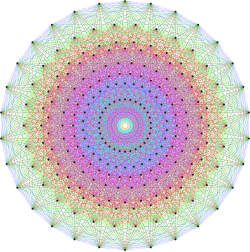
Back رياضيات بحتة Arabic Matemátiques pures AST نظری ریاضیات AZB Саф математика BA বিশুদ্ধ গণিত Bengali/Bangla Matemàtica pura Catalan Čistá matematika Czech Таса математика CV Mathemateg bur CY Καθαρά μαθηματικά Greek
This article is written like a personal reflection, personal essay, or argumentative essay that states a Wikipedia editor's personal feelings or presents an original argument about a topic. (December 2023) |
| Part of a series on | ||
| Mathematics | ||
|---|---|---|
|
|
||
|
| ||

Pure mathematics is the study of mathematical concepts independently of any application outside mathematics. These concepts may originate in real-world concerns, and the results obtained may later turn out to be useful for practical applications, but pure mathematicians are not primarily motivated by such applications. Instead, the appeal is attributed to the intellectual challenge and aesthetic beauty of working out the logical consequences of basic principles.
While pure mathematics has existed as an activity since at least ancient Greece, the concept was elaborated upon around the year 1900,[2] after the introduction of theories with counter-intuitive properties (such as non-Euclidean geometries and Cantor's theory of infinite sets), and the discovery of apparent paradoxes (such as continuous functions that are nowhere differentiable, and Russell's paradox). This introduced the need to renew the concept of mathematical rigor and rewrite all mathematics accordingly, with a systematic use of axiomatic methods. This led many mathematicians to focus on mathematics for its own sake, that is, pure mathematics.
Nevertheless, almost all mathematical theories remained motivated by problems coming from the real world or from less abstract mathematical theories. Also, many mathematical theories, which had seemed to be totally pure mathematics, were eventually used in applied areas, mainly physics and computer science. A famous early example is Isaac Newton's demonstration that his law of universal gravitation implied that planets move in orbits that are conic sections, geometrical curves that had been studied in antiquity by Apollonius. Another example is the problem of factoring large integers, which is the basis of the RSA cryptosystem, widely used to secure internet communications.[3]
It follows that, presently, the distinction between pure and applied mathematics is more a philosophical point of view or a mathematician's preference rather than a rigid subdivision of mathematics.[4]
- ^ "Pure Mathematics". University of Liverpool. Retrieved 2022-03-24.
- ^ Piaggio, H. T. H., "Sadleirian Professors", in O'Connor, John J.; Robertson, Edmund F. (eds.), MacTutor History of Mathematics Archive, University of St Andrews
- ^ Robinson, Sara (June 2003). "Still Guarding Secrets after Years of Attacks, RSA Earns Accolades for its Founders" (PDF). SIAM News. 36 (5).
- ^ Koperski, Jeffrey (2022). "Mathematics" (PDF). European Journal for Philosophy of Science. 12 (1): Article 12. doi:10.1007/s13194-021-00435-9. Retrieved October 16, 2024.